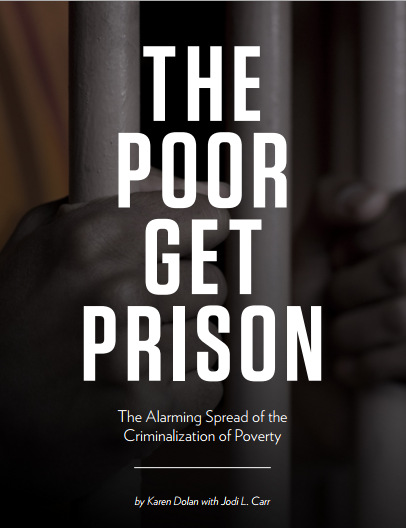 KAREN DOLAN, karen at ips-dc.org, @
KAREN DOLAN, karen at ips-dc.org, @
JODI L. CARR, jodicarr at verizon.net
Dolan is a fellow at the Institute for Policy Studies and directs the Criminalization of Poverty Project. Carr is a research associate with the group and a doctoral student in education policy at George Mason University. They co-wrote a recently-released report: “The Poor Get Prison: The Alarming Spread of the Criminalization of Poverty,” which includes an introduction by Barbara Ehrenreich.
The report finds: “Poor people, especially people of color, face a far greater risk of being fined, arrested, and even incarcerated for minor offenses than other Americans. A broken taillight, an unpaid parking ticket, a minor drug offense, sitting on a sidewalk, or sleeping in a park can all result in jail time. In this report, we seek to understand the multi-faceted, growing phenomenon of the ‘criminalization of poverty.’
“In many ways, this phenomenon is not new: The introduction of public assistance programs gave rise to prejudices against beneficiaries and to systemic efforts to obstruct access to the assistance.
“This form of criminalizing poverty — racial profiling or the targeting of poor black and Latina single mothers trying to access public assistance — is a relatively familiar reality. Less well-known known are the new and growing trends which increase this criminalization of being poor that affect or will affect hundreds of millions of Americans. These troubling trends are eliminating their chances to get out of poverty and access resources that make a safe and decent life possible.”
The report highlights:
– “the targeting of poor people with fines and fees for misdemeanors, and the resurgence of debtors’ prisons — the imprisonment of people unable to pay debts resulting from the increase in fines and fees;
– “mass incarceration of poor ethnic minorities for non-violent offenses, and the barriers to employment and re-entry into society once they have served their sentences;
– “excessive punishment of poor children that creates a ‘school-to-prison pipeline’;
– “increase in arrests of homeless people and people feeding the homeless, and criminalizing life-sustaining activities such as sleeping in public when no shelter is available; and
– “confiscating what little resources and property poor people might have through ‘civil asset forfeiture.’ …
“Private companies are profiting off the expanded number of people in the criminal justice system by charging fees for supervision and other costs related to probation. If the people under probation cannot pay, they often face jail time.”
See: PDF of the full report.